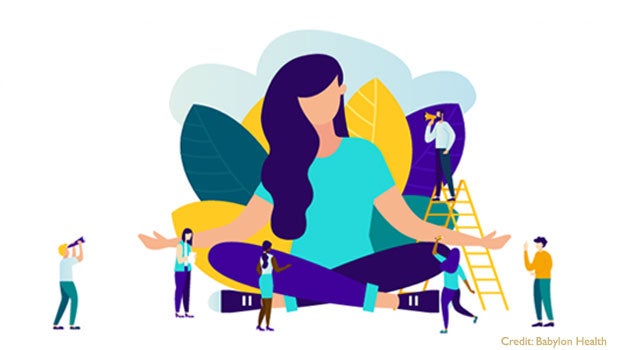
Professor Mark Williams, former director of the Oxford Mindfulness Centre defined mindfulness as “knowing directly what is going on inside and outside ourselves, moment by moment”. The practice of mindfulness has been around for thousands of years and has been proven to aid in combating depression, anxiety, chronic pain, insomnia and stress. With such benefits, the practice has continued to gain momentum in today’s fast-paced world, especially in the time of COVID-19.
To learn more about mindfulness, its benefits and how SingHealth staff can approach the practice, we spoke to Dr Kinjal Doshi, Principal Clinical Psychologist, Department of Psychology, Singapore General Hospital (SGH), and Programme Convenor of the iTHRIVE (i Transforming Healthcare through Resilience, Innovation, Values and Excellence) Programme.
Bringing awareness to mindfulness
Dr Doshi is no stranger to the practice of mindfulness and educating others about it. Since 2014, a year after she joined SGH, she has been running myriad programmes for nurses, stroke survivors and caregivers.
Today, she is one of the key faculty members of the iTHRIVE Programme, which runs multiple cluster-wide initiatives such as weekly mindfulness sessions. iTHRIVE was conceptualised after the Institute of Patient Safety & Quality (IPSQ) ran its first Resilience in Academic Medicine workshop. Like-minded participants like Ms Tan-Huang Shuo Mei, who oversees the SingHealth Staff Care Centre (S2C2), Dr Phua May Ling, Chief Operating Officer (COO), Education, Office of SingHealth Academy, and Dr Doshi shared the vision of making mindfulness accessible to all SingHealth staff as part of efforts to strengthen staff resilience.
With Ms Jennifer Davis, Director, Student Personal & Professional Leadership at Duke-NUS Medical School, Dr Doshi leads Mindfulness Hour, a weekly introductory session to mindfulness open to all SingHealth staff. The sessions bring attendees through guided meditation and mindfulness practices before an invitation to share their reflections. While Dr Doshi and Ms Davis generally employ the methods and techniques they have been trained and practised, they adapt the sessions from week to week, pulling from their experiences and wealth of knowledge. “The response to the sessions has been overwhelming. Limited registration slots for pilot sessions filled quickly and even now, with increased capacity, demand for Mindfulness Hour remains high”, said Dr Doshi.
When COVID-19 brought Singapore into a nationwide circuit breaker and a subsequent safe re-opening phase, Dr Doshi and the iTHRIVE team made the decision to bring Mindfulness Hour online. “One of the greatest challenges with bringing Mindfulness Hour online was the lack of physical connections that facilitate sharing,” Dr Doshi explained, “Not only are we, as moderators, hindered from picking up on body language cues from the attendees to spark conversations, the attendees themselves are also less inclined to speak up voluntarily in the online environment.”
“However, there have also been some benefits. For example, the sessions are now more accessible to staff across the cluster. This has offered us greater connectivity to our colleagues from institutions based outside the SGH campus that was not previously possible with our in-person sessions held at the SGH campus.”
Dr Doshi and the iTHRIVE team are also constantly exploring additional practices and modalities of helping staff manage their stress. Recently, the team introduced ARTpreciate, weekly art appreciation and experiential sessions launched in partnership with the National Gallery Singapore and the Singapore Art Museum. The sessions are led by Ms Dian Handayani, Art Therapist in SGH’s Department of Psychology.
Today, this lunchtime mindfulness programme is growing organically and is joyfully supported by IPSQ, SingHealth Academy and S2C2.
“How can I practice mindfulness?”“Give yourself the opportunity to practice being fully engaged and present with yourself,” explained Dr Doshi. “Try not to set any expectations for yourself other than to explore. Start small and feel free to figure it out as you go along!” Dr Doshi recommends identifying a simple practice you might like to do – it could be as simple as a breathing exercise or thinking of three positive things – and setting aside specific times of the day to do it. “It’s not so much about hiding somewhere in a corner of your home or office to meditate,” laughed Dr Doshi. “Whenever you give yourself the opportunity to be fully immersed in simply being grateful and in the moment, you are practicing mindfulness.” “Are there any tools or resources that might help me?”MindFi is an app that offers its users a library of mindfulness exercises, which can be customised by the user according to their intention for engaging in these practices, for example, practices for developing focus or to improve sleep and mood. Aside from these, the app also offers courses, weaved into bite-sized practices that can be easily incorporated into users’ daily routines to fit their mood or intentions for the day. In partnership with local certified mindfulness teachers, MindFi has launched “Mindcare for #SGHealthcare”, a community initiative to make a year of subscription to the app free for all public healthcare staff. Please visit https://getmindfi.com/mindcare (via internet-enabled devices) for more information. The SingHealth Staff Care Centre (S2C2) Resource Page on HealthXchange also offers a variety of self-care and mindfulness content, readily available at your fingertips! S2C2 HealthXchange Resource Page: |













 Get it on Google Play
Get it on Google Play